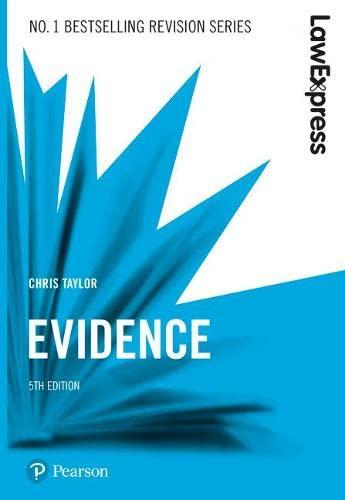Question
Question : The case of Coca Cola Co. v. Koke Company of America is one that reviews the issue of protection of trademarks.Read the analysis
Question: The case of Coca Cola Co. v. Koke Company of America is one that reviews the issue of protection of trademarks.Read the analysis of this case and determine, under the circumstances, if was necessary to protect Coca Cola in this instance.NOTE THE DATE WHEN THIS RULING WAS RENDERED.Would the ruling be the same today?Why?Read the "What if the Facts Were Different" portion of the brief.How would you reply?
This is not a paper or essay. It is a discussion questions and within the bounds of Coursehero, I've had questions like this answered plenty of times.
I've attached the case problem from the textbook below. If you need the link to the case, it is: https://caselaw.findlaw.com/us-supreme-court/254/143.html
Facts
The Coca-Cola Company brought an action in a federal district court to enjoin other beverage companies from using the words Koke and Dope for their products. The defendants contended that the Coca-Cola trademark was a fraudulent representation and that Coca-Cola was therefore not entitled to any help from the courts. By use of the Coca-Cola name, the defendants alleged, the Coca-Cola Company represented that the beverage contained cocaine (from coca leaves). The district court granted the injunction, but the federal appellate court reversed. The Coca-Cola Company appealed to the United States Supreme Court.
Issue
Did the marketing of products called Koke and Dope by the Koke Company of America and other firms constitute an unauthorized use of Coca-Cola's trademark?
Decision
Yes for Koke, but no for Dope. The Court enjoined (prevented) the competing beverage companies from calling their products Koke but did not prevent them from calling their products Dope.
Reason
The Court noted that, to be sure, prior to 1900 the Coca-Cola beverage had contained a small amount of cocaine, but this ingredient had been deleted from the formula by 1906 at the latest, and the Coca-Cola Company had advertised to the public that no cocaine was present in its drink. Coca-Cola was a widely popular drink "to be had at almost any soda fountain." Because of the public's widespread familiarity with Coca-Cola, the retention of the name of the beverage (referring to coca leaves and kola nuts) was not misleading: "Coca-Cola probably means to most persons the plaintiff's familiar product to be had everywhere rather than a compound of particular substances." The name "Coke" was found to be so common a term for the trademarked product Coca-Cola that the defendants' use of the similar-sounding "Koke" as a name for their beverages was disallowed. The Court could find no reason to restrain the defendants from using the name "Dope," however.
What If the Facts Were Different?
Suppose that Coca-Cola had been trying to make the public believe that its product contained cocaine. Would the result in the case likely have been different? Explain your answer.
Impact of This Case on Today's Law
In this early case, the United States Supreme Court made it clear that trademarks and trade names (and nicknames for those marks and names, such as the nickname "Coke" for "Coca-Cola") that are in common use receive protection under the common law. This holding is significant historically because it is the predecessor to the federal statute later passed to protect trademark rights (the Lanham Act of 1946, to be discussed below).
Step by Step Solution
There are 3 Steps involved in it
Step: 1

Get Instant Access to Expert-Tailored Solutions
See step-by-step solutions with expert insights and AI powered tools for academic success
Step: 2

Step: 3

Ace Your Homework with AI
Get the answers you need in no time with our AI-driven, step-by-step assistance
Get Started


